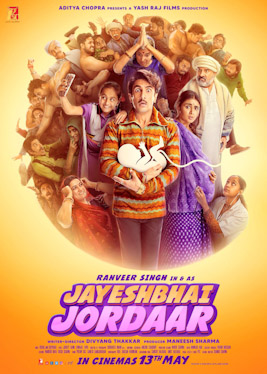17 May Jayeshbhai Jordar : Inclusive Masculinities Hero

“Because he’s the hero Gotham deserves, but not the one it needs right now.” – Jim Gordon on Batman, The Dark Knight (2008)
Despite appearances, Jayeshbhai may not be a far cry from the DC superhero. He uses stealth and subterfuge and fights against something way larger than him. We may diss him, as he doesn’t kill everything that moves or he doesn’t ripple his six-packs. The truth is, he isn’t the hero we are used to. But he may as well be the hero we really deserve, though we do not think so at this moment.
In the Hindi film industry, Tamil, Telegu, or Kannada film industry, hyper-masculine heroes and grand narratives of epic proportions seem to be the trend. In comparison, Jayeshbhai Jordar may appear pale, but dismiss it at your own risk. Ranveer Singh’s Jayesh is nothing like him – his body, costumes, and demeanour are all ordinary. Jayesh’s superpower is that he is unafraid to feel. He wears his feelings unabashedly. He bawls, he weeps, he snivels as he suffers. He is gentle and soft-spoken; he loves his wife and daughter and tries feebly to fight back.
What is wrong with him? He can’t adhere to the script handed down to him. He can’t be the man that society wants him to be. He survives by playing along and subverting the rules until he is pushed to stand in the open. Even then, he doesn’t transform into a killing machine. His resistance feels authentic as it is human. He could be pushed around, tied, locked, gagged like the women around him. The minute he rejects the gender role, he is punished by patriarchy.
We know that the film is a response to female foeticide. It builds on the unfortunate practice where even the medical fraternity is coerced into colluding with families. Jayesh finally decides to intervene and save his wife. However, curiously enough, confronting his parents directly is never the solution in the film. Jayesh’s responses are always non-confrontational. The shift happens when passive resistance becomes active rebellion. Though this rebellion is caged as soon as possible, it amounts to something.
Jayeshbhai’s plot revolves around saving his unborn daughter, his marriage, and his wife, Mudra (Shalini Pandey). He decides that he will not allow the termination of her pregnancy yet again. But what do we know about Mudra? She is more than the bearer of the womb, but the film does not show us that. I wish we had gotten to see and hear more of her. What is her world like? Couldn’t she have been her own saviour? But despite the male saviour complex, the film seems to work. Discussions on consent and pleasure in marriage and the role of social conditioning on macho behaviour may seem too preachy for some but relevant to others. Haryana is made to reach out, quite literally so, as a cautionary tale. The Haryanvi pehalwaans (Puneet Issar et al.) are so endearing that they are by far the best poster children of inclusive masculinities that I have ever witnessed. You just don’t expect such tenderness with such physique.
In the 80s, Ketan Mehta’s Mirch Masala showed us how women’s voices, although crushed systemically, can shake up society. The director Divyang Thakkar tips his head to Mehta’s opus but adds humour, even of the slapstick variety. The scenes depicting domestic violence brought out humour at the everyday horror of domestic violence faced by countless women every day. I was petrified at that point, but I also understand that the film pokes fun at a society that normalises brazen violence.
Having lived in Gujarat almost all my life, I have known decent, educated people who “deal with” unwanted female foetuses. It was heartening to see the theatre, in Ahmedabad, filled with women. I hope that if the audience were not like Deeksha Joshi’s fiery Preeti, they certainly would be like Ratna Pathak’s Jasoda, who will eventually turn around. I enjoyed the performances by Boman Irani, who carries the burden of playing the power-wielding patriarch single-handedly and Jia, who plays Ranveer’s on-screen daughter, the gritty-tech-savvy-tween, Siddhi. Many actors from the Gujarati cinema industry performed splendidly in the film. It is great to see regional talent being represented in mainstream cinema.
The film may rely on some stereotypes, but it does try to dismantle other ones. We need to see more representation of non-threatening, non-macho males as hero figures in cinema. Heroes need not always jump from one building to another, chasing villains. Those who try to escape toxic people and environments with loved ones are heroes, too!



No Comments